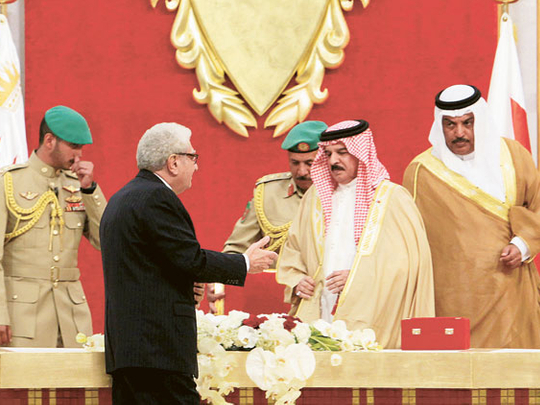
Manama: A report by an international fact-finding commission has taken Bahrain's authorities and opposition to task after it highlighted the violations they committed during ten months of unrest.
The Bahrain Independent Commission for Inquiry, set up by King Hamad in June, yesterday published the highly-anticipated report that consisted of 12 chapters, two annexes and seven appendices. Initial reactions ranged from embracing the report's recommendations to shock and scepticism.
The report said: "In many situations, the security forces violated the principles of necessity and proportionality, which are the generally applicable principles in matters relating to the use of force by law enforcement officials.
"This is evident in both the choice of the weapons that were used by these forces during confrontations with civilians and the manner in which these weapons were used.
"The security forces did not, at all times, strictly comply with their legal obligation to target the individuals in a manner that would disable or incapacitate the individual.
"The available evidence, including forensic and ordnance reports, indicates that on a number of occasions the security forces fired their weapons without taking due care to ensure that individuals were not fatally injured."
In his speech following the summary presented by Mahmoud Sharif Bassiouni, the chair of the BICI, King Hamad said that action would be taken against all those guilty of violations.
Absence of statute
The commission attributed the "numerous violations of due process rights" to the absence of a statute identifying the exact powers to be exercised by the government during a state of national emergency.
According to the report, the government "responded in a manner that suggests that it was not prepared for the ‘unpredictable events'".
"The forceful confrontation of demonstrators involving the use of lethal force and resorting to a heavy deployment of Public Security Forces led to the death of civilians," the report said.
"This caused a marked increase in the number of persons participating in protests and led to a palpable escalation in their demands," the report said.
"As protests continued into mid-March 2011, the general state of security in Bahrain deteriorated considerably.
Sectarian clashes were reported in a number of areas, attacks on expatriates took place, violent clashes occurred between students at the University of Bahrain and other educational institutions, and major thoroughfares, including the vital King Faisal Highway, were blocked by protesters.
This situation led the government of Bahrain to declare a State of National Safety on 15 March 2011."
According to the commission, the evidence presented by Bahrain on the involvement by Iran "does not establish a discernable link between specific incidents that occurred in Bahrain during February and March 2011 and the Islamic Republic of Iran".
However, the report said that "given that most of the claims made by Bahrain related to allegations of intelligence operations undertaken by Iranian operatives, sources of which, by their nature, are not publicly available, the Commission has not been able to investigate or independently verify these allegations of Iranian involvement in the events of February and March 2011".
Bahrain said that it has further information that demonstrates involvement by Iran in its internal affairs, but that due to security and confidentiality considerations, it has declined to share the information with the Commission.
No evidence
The Commission also said that it has not found any evidence of human rights violations committed by the Peninsula Shield, the military arm of the Gulf Cooperation Council (GCC) units deployed in Bahrain starting on March 14 and accused of engaging in military action against demonstrators.
King Hamad said that Bahrain would derive "maximum benefit from it".
"We are determined, God willing, to ensure that the painful events our beloved nation has just experienced are not repeated, but that we learn from them, and use our new insights as a catalyst for positive change," he said.
"We do not want, ever again, to see our country paralysed by intimidation and sabotage. We do not want, ever again, to learn that our expatriate work-force, which makes such valuable contributions to the development of our nation, has been repeatedly terrorised by racist gangs.
"We do not want, ever again, to see civilians tried anywhere else but in the ordinary courts. We do not want, ever again, to experience the murder of policemen and the persecution of their families for the work they do in protecting us all; nor do we want, ever again, to discover that any of our law enforcement personnel have mistreated anyone."












